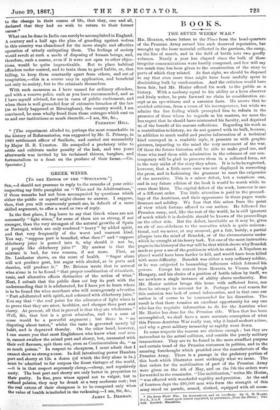GREEK WINES.
[To THE EDITOR OF THE "SPECTATOR."] SIR,—I should not presume to reply to the remarks of your critic respecting my little pamphlet on "Wine and its Adulterations," if those remarks had not been accompanied by questions which either the public or myself might choose to answer. I suppose, then, that you will courteously permit me, in default of a more skilled argument, to offer a word or two of reply.
In the first place, I beg leave to say that Greek wines are not necessarily "light wines," for some of them are as strong, if not stronger, than the very strongest of the natural growths of Spain or Portugal, which are only rendered " heavy " by added spirit, and that very frequently of the worst and coarsest kind. You say, "suppose port is brandied, what then ?" and "suppose elderberry juice is poured into it, why should it not be, if people like elderberry juice ?" My answer is that the
mixture is bad, for two reasons, if not more. First, as Dr. Lankester shows, on the score of health. "Sugar alone will not produce gout, but sugar with alcohol, as in ports and sherries, will produce it." Dr. Briuton wrote that in natural wine alone is to be found "that proper combination of stimulant, tonic, and alterative effects distinctive of the action of wine." Next, I submit that the public does not buy its port with the understanding that it is adulterated, for I have yet to learn where is to be found the wine merchant who will courageously advertise "Port adulterated with spirit, and coloured with elderberry juice." You say that "the real point for the advocates of light wines is to prove that they are nicer, healthier, and cheaper than port and sherry. At present, all that is proved is that they are wholesome." Well, Sir, that last is a great admissfon, And to a man of sense would be a powerful argument ; but there is "no disputing -about tastes," whilst the taste is governed merely bi habit, and is depraved thereby. On the other hand, however, I can assure you that most Englishmen who know what real wine is, cannot swallow the mixed port and sherry, but, nauseated with their evil flavours, spit them out, even as Continentalists do, "as so much poison." In respect to cheapness, I must admit that I cannot show so strong a case. In dull intoxicating power Hambro port and sherry at 12s. a dozen (of which the duty alone is 5s.) must be' admitted to far surpass the finest vintages of the world, —it is in that respect supremely cheap,—cheap, and repulsively nasty. The best port and sherry are only better in proportion to their purity. In fine, pure wines appeal not to vulgar, but to refined palates, they may be drunk at a very moderate cost ; but the real extent of their cheapness is to be computed only when the value of health is included in the reckoning.—I am, Sir, &c.,
JAMES L. DElotAx.






























 Previous page
Previous page